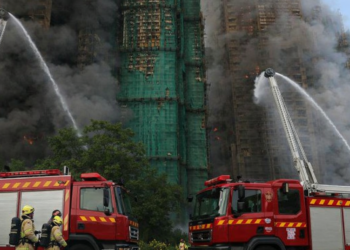Sudan finds itself embroiled in a complex internal conflict that has lasted for over two months, causing widespread devastation in the capital and triggering violent confrontations in the Darfur region. The clashes between Sudan’s army and the paramilitary Rapid Support Forces (RSF) have resulted in a massive displacement of more than 2.5 million people, leaving them vulnerable to disease and malnutrition.
Attempts at achieving peace through various ceasefires, brokered by influential nations such as the United States and Saudi Arabia, have repeatedly failed due to the stubborn refusal of both sides to comply with the agreed-upon terms.
The recent escalation of hostilities in Khartoum on Sunday saw warplanes and intense fighting between loyalist forces of army chief Abdel Fattah al-Burhan and the RSF. Witnesses reported attacks on a police base and the state television building, along with claims of an army MiG fighter being shot down by the RSF. The situation is further aggravated by the mobilization of RSF vehicles towards the Armoured Corps in central Khartoum.
The consequences of this war have been severe. According to the International Organization for Migration, the conflict has claimed the lives of nearly 3,000 people and displaced 2.2 million within Sudan’s borders, while another 645,000 have sought refuge in neighboring countries. The African proverb, “When elephants fight, it is the grass who suffers,” rings true as innocent Sudanese civilians bear the brunt of this power struggle.
Displaced Sudanese in camps along the border with South Sudan, particularly in White Nile State, face grave challenges. Doctors Without Borders (MSF) highlighted the hardships endured by these vulnerable populations, including suspected cases of measles and a dire malnutrition crisis among children. MSF reported the treatment of numerous children for measles, with several fatalities, underscoring the urgent health emergency.
The conflict’s epicenter lies in Khartoum and in the western region of Darfur, where the RSF and allied Arab militias have been accused of deliberately targeting and killing civilians based on their ethnicity. The death toll is expected to be much higher than reported, with a significant portion of health facilities rendered inoperable due to the fighting. The dire circumstances have left many wounded individuals unable to access medical care, while bodies remain unburied in the streets of Khartoum and Darfur.
The devastation caused by the war has crippled Sudan’s already fragile infrastructure, leaving residents grappling with shortages of water and electricity amid sweltering summer conditions. The dire humanitarian situation has prompted the United Nations to declare that a staggering 25 million people in Sudan are in urgent need of aid and protection.
Drawing a somber parallel, observers cannot help but be reminded of the Rwandan Genocide in 1994. The similarities lie in the protracted civil war, the failure of peace accords, and the subsequent outbreak of genocidal killings targeting specific ethnic groups. The international community’s failure to intervene forcefully to halt the Rwandan Genocide serves as a grim reminder of the devastating consequences when conflicts are left unchecked.
In my opinion, the situation in South Sudan is deeply concerning. The ongoing war has resulted in immense suffering, displacement, and loss of life. It is disheartening to witness the devastating impact on the civilian population, particularly women and children who are the most vulnerable.
I firmly believe that peace should always be pursued, regardless of the associated costs. The current turmoil in South Sudan serves as a stark reminder of the futility and destructive nature of war. The long-term consequences of armed conflicts are devastating, leaving behind shattered communities, broken infrastructure, and immense human suffering.
The international community, including influential nations and regional organizations, must prioritize diplomatic efforts and work together to put an end to the violence. By supporting the AU and IGAD mediation efforts and fostering dialogue between the warring factions, there is hope for a peaceful resolution that can bring stability and alleviate the immense humanitarian crisis.
Ultimately, it is crucial to recognize that war is not a viable solution to any problem. The human and societal costs far outweigh any perceived gains. Instead, the focus should be on finding common ground, promoting understanding, and working towards sustainable peace for the sake of the South Sudanese people who deserve a better future.














